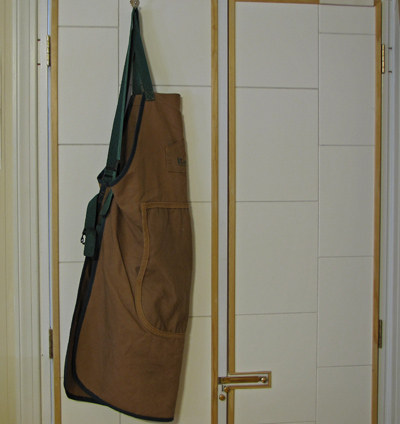[Note to Heartwood readers: the series on drawer making has a few more entries on the way.]
This is the time of year when NFL rosters get pared down to the final 53 players. It is often reported how veteran players attribute much of their success to the unspectacular but important training, preparation, and performance principles that promote survival in the extremely competitive league. These are not matters of specific football technique, but rather are work habits that allow their physical abilities and football skills to flourish.
Sure, I have relentlessly gleaned woodworking understanding and technique from countless sources over several decades. I love learning. Yet there are mundane shop work habits, borrowed or discovered, that I have come to value as equally important. Readers, let me share with you just some of the things about which I’ve had to “get my mind right.”
1. Know, don’t hope, what a process will yield. When bringing steel to wood while building a project, it should be clear to you what the result will be. Your hand may wander, your line may be a bit off, but there must be reliable intent and integrity in the process before you start. This allows the craftsperson to work with confidence and relaxation. For example, if you find yourself thinking, “Maybe if I feed the router this way, it might cut OK,” it’s time to step back and rethink.
2. Be neither blind to innovation nor saddled with doubt. Trial runs and testing are useful, especially for unfamiliar processes, but give yourself credit for what you already know. While there are almost always several ways to get a result, if you have learned a good, efficient method, go with it and get the job done.
3. When constructing multiple parts, it is often helpful to carry the process to completion on one part to see how early steps influence later results. This gives you a chance to modify steps to improve the final product. It often helps, therefore, to make an extra part.
4. Before leaving the shop for the day, note where you left off, perhaps write it down, so when you return you can resume work without hesitation. For example, “drawers fit, no more trimming.”
5. Put away tools when a job is done. Keep your bench and mind clear.
6. A process in one wood may not work well in a different species or even a different board of the same species. Remember, wood is a biological product, it varies. Making a mortise and tenon in bubinga feels different from making the same joint in pine.
7. Attempt to cut to the line while knowing what happens if you are off on one side or the other. Leaving large margins of safety because you’ll “make it exact later” is a way to never get good at woodworking. Go for it. If you make a mistake, relax.
8. Creating useful and beautiful things from wood is one of the fine things in life. Be grateful, be humble, give thanks.
Happy woodworking!



The corollary to #4 – When you enter the shop, have an idea of what you want to accomplish today. I’ve found that if I wander into the shop, I’m far less efficient with my time there. Even if you don’t get as much done as you set out to, it is better to work towards a specific goal for the day.
Yes, I agree! Thanks for adding that. I appreciate your comments and thanks for reading.
Rob
Rob, great tips and after reading, I was surprised (at myself) how many of these things I do without thinking about it. One add if you don’t mind, and one I do think about, “Be sure you know where both hands are when making a cut, powered or unpowered” Take Care
Hi Rick,
Yea, where they are and where they’re going during the cut. Thanks for the comment.
Rob